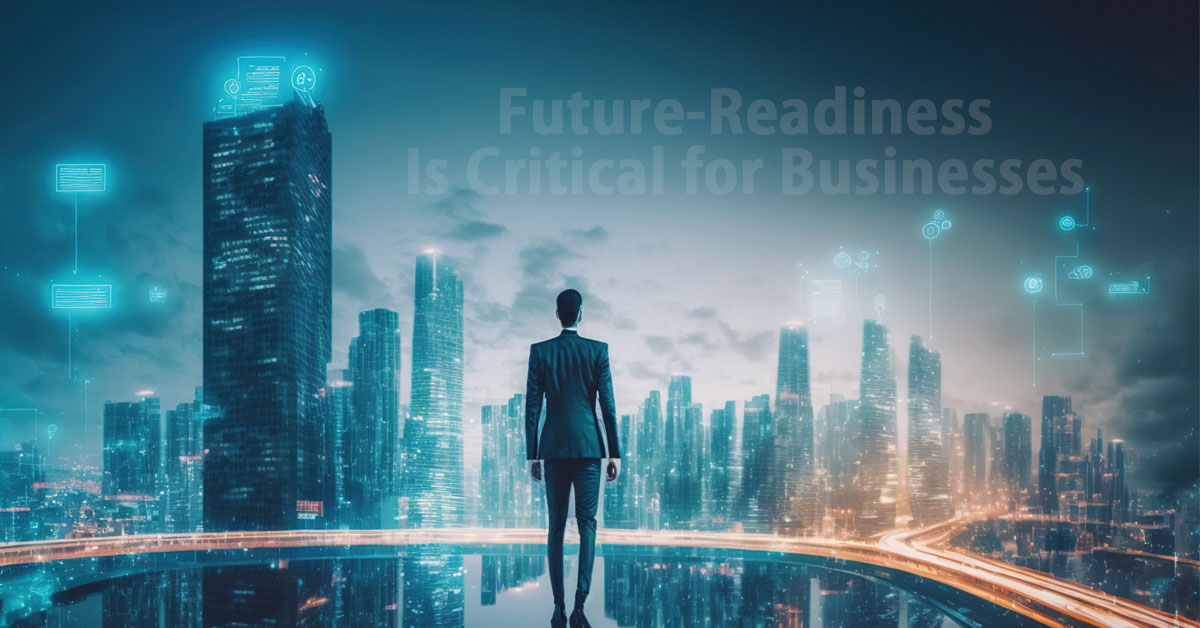Why Future-Readiness Is Critical for Businesses

4 min read
Businesses that want to stay competitive need to be future-readiness. With so many new innovations happening every day, why not get the latest and greatest updates?
This blog will explore what it means for a business to be future-ready, and what Business Communication Services can do for companies. Read on if you want the keys to stay on top of your industry!
The idea of being future-ready has become a trendy topic in recent years as more and more businesses are looking for ways to stay ahead of their competition. Companies must offer not only better products but also a better customer experience in order to ensure profitability.
Changing Customer Expectations
Customers today expect businesses to offer a wide range of services, products, and experiences. For instance, customers expect their favorite brands to be available on any screen they choose, and they are comfortable shopping online. In addition, customers demand greater transparency from businesses regarding their offerings and how those offerings affect the environment. Businesses that fail to offer what the digital customer wants to risk losing them to competitors.
Growing Global Competition
The pace of global competition is quickening as companies across industries rush into new markets for growth opportunities. Companies that want to capitalize on this growth must stay future-ready in order to compete effectively in dynamic global markets with different regulations, preferences, and customs.
In addition to local competition, companies must now stay aware of competition from all over the world.
The increasing pace of global competition requires businesses to be future-ready for any situation.
Competitive Risks
Businesses that fail to offer the latest services or products may miss out on market opportunities and miss out on opportunities for growth. If they don’t adapt, they can fall behind their competitors, and eventually, they may be forced to exit the market entirely if new competitors come in and offer better options or more innovation. Therefore it is important for businesses to stay forward-thinking as a company in order to make sure that they are not sacrificing their return on investment (ROI).
In fact, there is a lot that technology can do to help businesses stay future-ready and competitive. Many companies have embraced the idea of going digital in order to get ahead of their competition.
A business is always changing as people request new services and products. The process of choosing which services to offer customers can be overwhelming for some companies. In order to stay ahead of the curve, a company must be prepared at all times for the changes they may see in demand by their customers.
There are a number of ways that businesses can become future-ready. One of the most important ways is to stay abreast of changes in the technology industry. The foundation for a future-ready business comes from having an effective service model, and effective service models require new technology and applications. For example, when businesses use mobile devices or apps, they often need to integrate those apps with other systems.
Businesses that have embraced technology have found it necessary to stay current on emerging technologies as those trends change the needs of their customers, and therefore, their business models.
Diverse Workforce
The world is increasingly diverse, and this diversity is extending to businesses’ workforces. Businesses that do not continue to evolve their workforce risk losing talented employees. This can potentially lead directly to a drop in business performance and eventually, lower profitability.
The government agencies want to secure their sensitive data at any cost. UCaaS Providers, whichever is greater to secure the data. However, even the most advanced government agency will not be able to accomplish this goal without a structured approach and proven technology solutions from prime contractors – all while maintaining operational effectiveness.
Tailored Products and Services
Customers today tend to be more demanding, making it vital for businesses to continually offer them tailored products and services. Whether it is a personalized service, a product made to fit customers’ specifications, or a fully customized experience beyond just the product or service being delivered, businesses that offer personalized offerings are likely to maintain loyal customers.
Increased Customer Connectivity
With greater connectivity comes greater expectations about the speed of response from companies. Customers expect brands to quickly address issues they encounter with their products or services in an effortless way across any channel or device they choose. Businesses that fall short of offering seamless customer experiences face reputational damage and risk losing customers.
Customization
Customers now expect to be able to customize services in ways that were unthinkable. They want personalized experiences, tailored to their individual needs. Once again, the speed of response is important, as customers expect businesses to be able to react quickly and effectively. Most importantly, they want consistency.
Integration
For many industries, customer information is increasingly crucial for all service providers and channels involved. As a result, customers demand increased integration across these distribution channels, making it necessary for businesses to have a complete view of their customers’ life cycles across all touch points. With greater integration comes greater efficiencies.
Collaboration
Customer expectations are higher than ever, not only of products and services but also of the organizations providing them. Customers expect companies to collaborate with other brands on a number of fronts, including product development and innovation, marketing and promotion strategies, logistics, manufacturing, and more. By emphasizing this collaboration, companies can develop stronger relationships with customers that lead to greater loyalty.
Customer Focus
Customers now demand an increased focus from businesses on their needs and interests as well as the needs of the customer service team. This means that businesses need to work closely with customers to identify key areas of interest or concern in order to provide customized solutions for each customer and ensure that the company is customer-focused.
Automation
The world of business has seen a massive increase in automation over the last decade. Customers expect companies to configure and customize products and services based on their unique needs. Customer interaction is
minimized in favor of greater customer-centricity, with automation reducing the need for human interaction. It’s extremely important that businesses use automation as a tool to respond to customers’ needs. Instead of forcing them into systems that are not responsive enough for today’s customers.
Achieving Future-readiness
To gain future readiness that truly meets customer expectations. Businesses must be willing to change inside and out, including altering their processes, management style, products and services, marketing strategies, technology focus, and more.
Conclusion
To build a future-ready business that truly addresses customer expectations, businesses should consider the UCaaS Providers and focus on providing even greater value in those top priority areas. Identify key areas of focus that will deliver greater customer value. Identify the areas where your brand delivers the greatest value to your customers, or where you can add more value.
We make changes in management style, processes, and systems to become more responsive and open to change. Customer expectations are changing rapidly.
Companies must be willing to change their business models and practices as well. We are flexible and open-minded about new ideas that may solve customers’ problems.
Published: November 27th, 2023
Subscribe to Our Latest Updates
Get monthly product and feature updates, the latest industry news, and more!







